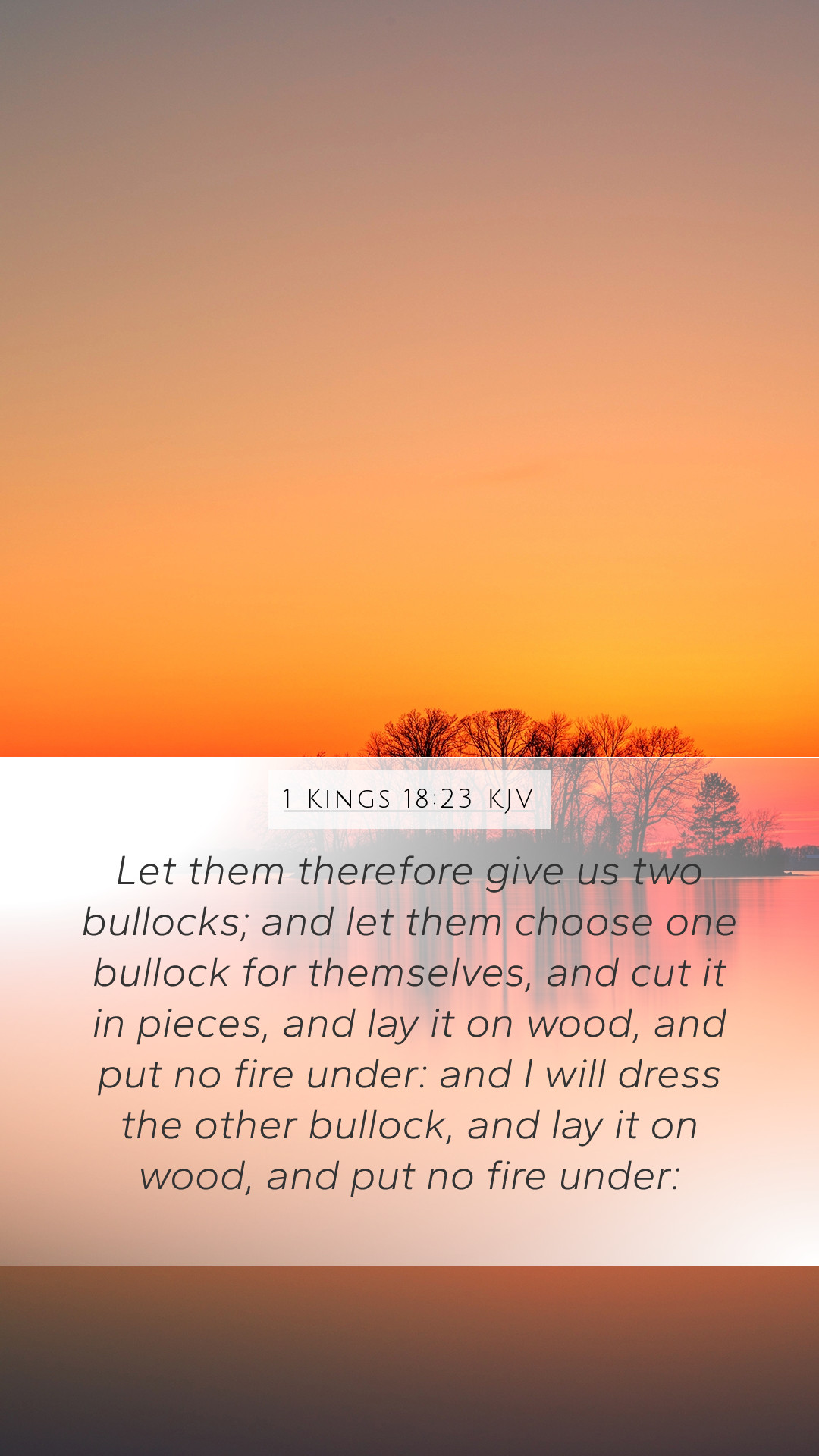Understanding 1 Kings 18:23
Bible Verse: 1 Kings 18:23 - "Let them therefore give us two bullocks; and let them choose one bullock for themselves, and cut it in pieces, and lay it on wood, and put no fire under: and I will dress the other bullock, and lay it on wood, and put no fire under."
Overview
This verse occurs during the confrontation between the prophet Elijah and the prophets of Baal on Mount Carmel. The challenge presented here is significant and reveals deep theological and cultural implications. Elijah's call for a test of the true God highlights the tension between idolatry and true worship.
Insights from Public Domain Commentaries
Matthew Henry's Commentary
Matthew Henry emphasizes the boldness of Elijah's challenge to the prophets of Baal. He notes that this display of faith serves two purposes: it is designed to demonstrate the futility of Baal worship and the power of the God of Israel. By laying out the terms of the contest, Elijah seeks to show that real worship requires evidence and results, contrasting with the false prophets who could not produce results. Henry points out that the act of preparing the bullocks is deeply symbolic, representing the sacrifice required for true worship.
Albert Barnes' Notes
According to Albert Barnes, the specifics of the challenge highlight the certainty and clarity of the test. The prophets of Baal are instructed to prepare their bullock first, without applying fire, as a means to evoke the genuine response from their supposed deity. Barnes extrapolates that this methodical approach not only demonstrates Elijah's confidence in Yahweh but also exposes the emptiness of Baal worship. The verse underscores themes of divine power being openly tested and the ultimate victory of the true God over false idols.
Adam Clarke's Commentary
Adam Clarke elaborates on the significance of the bullock as a sacrificial offering, which is a critical aspect in the context of Israelite worship. Clarke mentions that the use of bullocks in sacrifice was a common practice, and the instructions given are meticulous, reflecting the seriousness of the challenge. He emphasizes that Elijah’s actions were not merely a show of bravado but a strategic choice to expose the truth of God in a society rife with idolatry. Clarke suggests that the power of God is demonstrated through the faith and obedience of His prophet in stark contrast to the chaos of Baal worship.
Meaning and Significance
The challenge Elijah presents invites a direct confrontation between the true God of Israel and the false god Baal. This can be unpacked as follows:
- Faith in Action: Elijah's calm yet assertive challenge to the prophets signifies a profound faith that cannot be shaken by prevailing cultural norms.
- Public Display of Power: The entire scenario is designed to be public, showcasing that worship needs to be authentic and backed by demonstrated power.
- Symbolism of Sacrifice: The use of a bullock denotes sacrifice, central to the worship of Yahweh, which the prophets of Baal cannot replicate, illustrating the futility of their rituals.
- Context of Apostasy: The verse reflects a period where Israel had strayed from God, emphasizing the urgent need for revival and return to true worship.
Application to Daily Life
In examining this verse, modern readers can reflect on their own lives regarding:
- Idolatry Today: It challenges individuals to consider what modern-day idols they might be clinging to, whether materialism, fame, or even certain ideologies.
- Faith and Evidence: The challenge emphasizes the importance of having a faith that is evidenced by actions and results, urging believers to live out their faith visibly.
- Authenticity in Worship: It serves as a reminder that true worship needs to be sincere and heartfelt, not based on ritualistic practices or societal pressures.
Bible Cross References
This verse finds relevance in several other scriptures, including:
- Isaiah 46:1: God speaks against the idols and challenges traditional worship practices.
- 1 Kings 18:24: The continuation of the challenge, further emphasizing Elijah’s confrontation.
- Jeremiah 10:14: Highlights the futility of trust in idols.
Conclusion
1 Kings 18:23 serves as a potent reminder of the struggle between truth and falsehood in worship. Through the insights of respected commentaries, the richness of this verse unfolds, illustrating key components of faith, sacrifice, and the pursuit of a living relationship with God. Believers are encouraged to engage deeply with scripture, seeking understanding that anchors their faith and informs their daily lives.


